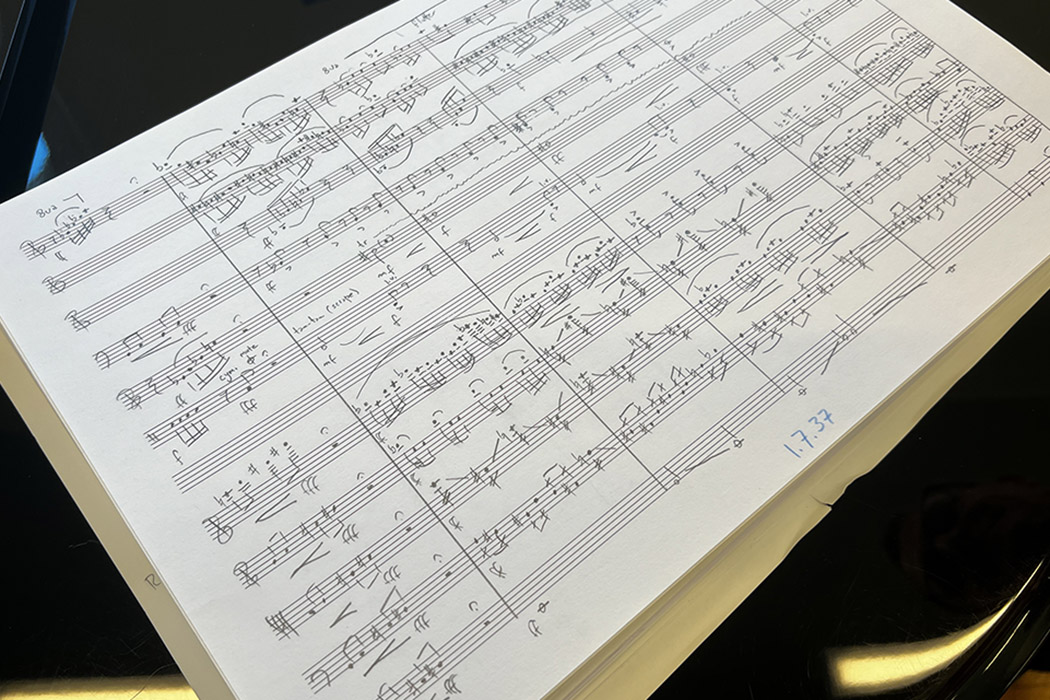Some have likened opera to a vast forest of trees, both very old and very grand, that cast immense shadows onto those that choose to walk among them. While there is a bit of historic truth in that picturesque simile, it ignores the fact that the forest has been changing over the last 75 years. The giants—Verdi, Wagner, Puccini, Mozart, and a host of others—still stand tall and inspire awe and joy. But on that forest floor, new operatic life springs up, often startling us with its evolution, inventiveness, and topical diversity.
New chamber operas—operatic works with diverse origins, smaller musical footprints, and more modest production requirements—have been an important part of opera’s evolution. Knoxville’s Marble City Opera has accepted this niche for many of its productions, and for its latest offering, has commissioned an original chamber opera from Knoxville composer Jason Overall. The Doctor and the Devils, featuring a libretto adapted by Overall from an unproduced screenplay by Welsh poet and writer Dylan Thomas, will receive its World Premiere in two performances on June 6 and 8 at the Old City Performing Arts Center.
Like many poets, Thomas struggled with earning a steady income throughout his life and found scriptwriting for radio and film companies in the UK as a workable solution. During World War II, the issue became particularly acute, but he found help from Donald Taylor of the Strand Film Company who was interested in moving beyond documentaries into dramatic films. One of Taylor’s ideas found fertile ground with Thomas—the 1820s true story of the Edinburgh, Scotland, anatomist Dr. Robert Knox who worked with “body-snatchers” to supply him with cadavers for research. A public scandal exploded when it was discovered that two of these so-called “resurrectionists,” William Burke and William Hare, were resorting to murder to fulfill the need. Although Taylor was able to have the Thomas screenplay of The Doctor and the Devils published in 1953 after Thomas’ death, he was never able to secure a production of it. However, a British adaptation by Ronald Harwood, directed by Freddie Francis, did make it to the screen in 1985, starring Timothy Dalton, Jonathan Pryce, and Stephen Rea.
Thomas renamed the historical characters, calling Robert Knox by the name of Thomas Rock, and changing the body-snatcher’s names to Bob Fallon and Broom. He nonetheless respected the historicity of the events, including the unclear extent to which Knox/Rock acknowledged his part in the murders. Of Thomas’s own invention are the philosophical implications, the social commentary on class, and the medical ethics implicit in the transaction. In this era of stem-cell research, Thomas’s questions gain new immediacy as we grapple with human control of life and death.
—Jason Overall
Overall explained how being an avid reader in high school led him to discover The Doctor and the Devils and set him on an operatic course. “I would frequent these used book stores in St. Louis,” Overall says “— and I loved the poetry of Dylan Thomas. I came across this trade paperback that looked peculiar—it had Dylan Thomas’ name on it, but it wasn’t published by New Directions, his normal publisher. It was the screenplay of The Doctor and the Devils and the last major work that Dylan Thomas completed before he died. It’s this fascinating story told in Dylan Thomas’ inimitable language.
“I always thought The Doctor and the Devils would make a fantastic second opera, but I didn’t want it to be my first foray as a composer in the genre. I wanted to get my musical legs under me first.”

Overall discovered that necessity has a way of changing one’s plans.
“Several years ago,” Overall explains, “[MCO Executive Artistic Director] Kathryn Frady approached me about writing a piece for Marble City Opera. This was a thrill because I sort of felt like I was arriving, at least at one compositional destination that I had been hoping for for a long time. We searched for months and months for a libretto. There were a couple of variables at play: she didn’t want to commission a new libretto; she wanted to work with something pre-existing. We would hunt down and get really close to finding something that worked really well, but, for one reason or another, it wouldn’t work out. Finally, I told her about The Doctor and the Devils and although I really wanted it as my second opera, this was a really compelling idea. She read it and fell in love with it as well.”
Despite the work’s implied dramatic darkness of subject matter, Overall felt the need to ease himself into the operatic genre.
“I felt like for my first foray into the genre, I didn’t want to appear too strange or push many boundaries. So, it’s the very traditional, Benjamin Britten type of chamber opera instrumentation: five winds, percussion, five strings. However, there’s plenty of latitude within that combination. That crayon box was plenty interesting; there were plenty of different instrumental colors available there to play with. I never felt limited by that.”
The cast of Marble City Opera’s The Doctor and the Devils
Stephen Salters – Doctor Rock
Cody Boling – Murray (Dr. Rock’s Assistant)
Lela Philbrook – Elizabeth (Rock’s Wife)
Ema Mitrovic – Annabella (Rock’s Sister)
Jenna Ziccardi – Jennie (Barmaid Courted By Murray)
Gianna Grigalonis – Alice (Barmaid)
John Overholt – Broom (Resurrectionist)
Daniel Johnson-Webb – Fallon (Resurrectionist)
Brandon Coffer – Music director and Conductor
Kathryn Frady – Director – Kathryn Frady is Executive Artistic Director and CEO of Marble City Opera
Jason Overall – Composer – Jason Overall is canon precentor and director of music of Saint John’s Episcopal Cathedral in Knoxville where he plays for all liturgies and oversees all aspects of the music program.
Music by Jason Overall – Libretto based on the screenplay by Dylan Thomas
Old City Performing Arts Center, 111 State Street
Thursday, June 6, and Saturday, June 8 – 7:00 PM
Tickets









Can’t wait to attend this premiere.